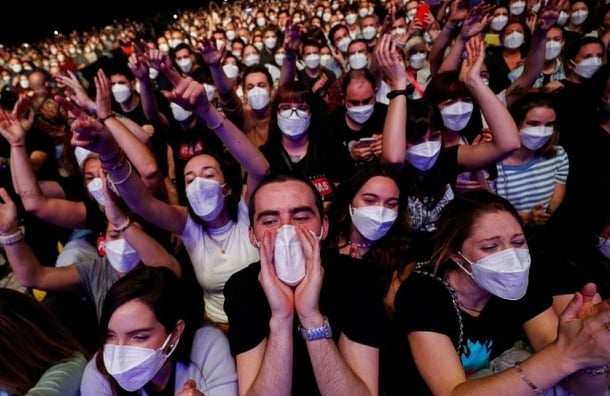
Outdoor unseated events like festivals presented the highest risk of Covid-19 transmission, data suggests
Scientists say ‘hierarchy of controls’ needed for events
As the Omicron variant reaches the UK, findings from the Government's test events scheme say masks and anti-crowding measures are necessary.
A "hierarchy of controls" for events are needed to reduce the risk of Covid-19 transmission, scientists say.
Enhanced ventilation, masks and anti-crowding strategies must form part of tailored mitigations for venues, according to the final report of the Events Research Programme (ERP), published last Friday (November 26).
The findings come as cases of the Omicron variant are detected in the UK, making the Government's Plan B for winter a more distinct possibility.
READ MORE:
Prime Minister Boris Johnson reintroduced mandatory mask wearing in indoor public settings on Saturday (November 27), but the measure does not currently extend to cinemas, theatres or other cultural spaces.
The Royal Shakespeare Company (RSC) was first to announce on Monday (November 29) it will require face coverings in all parts of its building unless audiences are eating or drinking.
Executive Director Catherine Mallyon said the decision was taken in light of the new guidance and feedback from its audiences, staff and acting company.
"Our priority is creating the safest and most comfortable environment for people to work in and visit, and we want to do all we can to ensure that we do not have to cancel performances and disappoint our audiences."
The Southbank Centre followed suit on Tuesday, with SOLT and UK Theatre advocating audiences' use of face masks on Thursday.
Mallyon noted the RSC auditorium's "extremely effective" ventilation systems – a key recommendation from the ERP report.
It says venues should strive for CO2 levels at or below 800 parts per million (ppm), a better air quality than most modern offices. Buildings with ventilation rates of 1500ppm or higher are considered "a priority for improvement".
In nearly all the ERP venues, areas such as the bathrooms, bar queues and entrance ways led to poor air quality. However The average CO2 level across 170 of 179 monitored spaces was below 800ppm, indicating a relative level of safety.
Among two million attendees, just 1.7% reported testing positive for Covid-19.
87% of those were unvaccinated.
Crowds pose higher risk
Attendees of Goodwood, Latitude and Tramlines festivals were 1.7 times more likely to contract Covid-19.
Whilst transmission at these events cannot be proven – journeys to and from, crowd behaviour and the prevalence of Covid-19 at the time are all factors – 1,543 of 2,012 reported cases (76%) occurred in the three to nine days after attendance.
This is in contrast to outdoor and indoor seated events, which showed "little evidence of increased transmission".
It is likely festivals presented the highest Covid-19 risk due to crowd density: on average they welcomed six people per square metre, compared to fewer than three people per msq at theatre events.
While air quality can be maintainted in highly crowded outdoor areas and opening windows and adding fans can improve ventilation indoors,"reducing overcrowding was found to be more immediately impactful," the report says.
But there are a lot of variables: scientists simulated 26 people's visit to the events and found a 45% difference in risk depending on their choice of seat and bar
Large or complex venues and high occupancy events should plan their risk mitigation strategies with ventilation experts, the report advises.
Mandatory measures work best
People are more likely to wear a mask if it is made mandatory, the research suggests.
Just 4% of people attending summer events where masks were optional wore one, compared to 77% when it was required.
"These pilots found compliance with certification protocols improved with clearer and more consistent communications," the report says.
This was difficult in some cases: stewards were learning on the job and certification checks increased queueing times, causing some attendees to miss the start of their events.
However, researchers predict these burdens will ease as staff and attendees become more familiar with the process.
"If certification were to be introduced in a Plan B scenario, the government would publish clear guidance for event organisers," the report says.
Join the Discussion
You must be logged in to post a comment.